Videos and Podcasts
CUSP researchers regularly speak at public events and invite guest speakers from various fields of expertise feeding into the work of CUSP. This page lists a series of videos and podcasts. For more resources, please see our Youtube Channel.
Subscribe to our website or editorial newsletter to receive regular updates from us.
For feedback and further information about our work, please contact us.
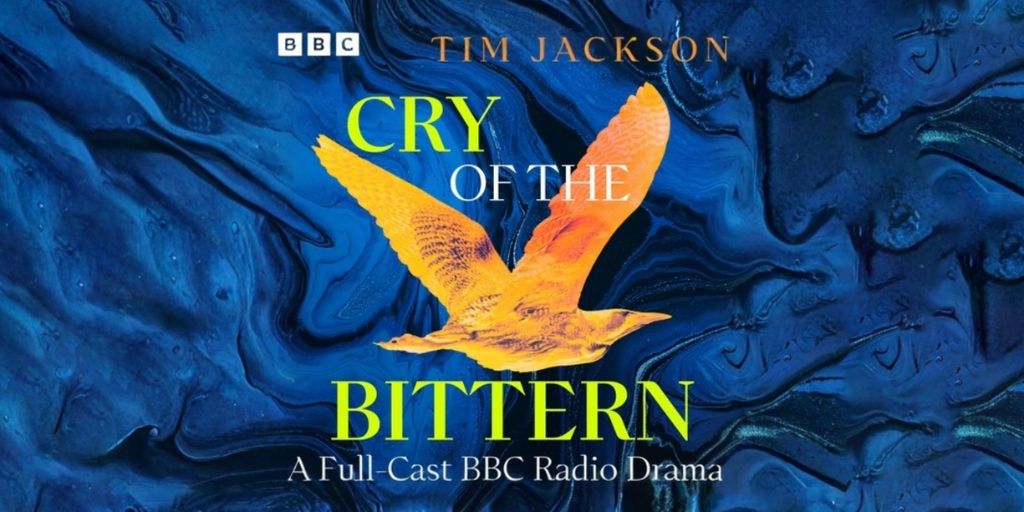
This month sees the audiobook release of Tim Jackson’s environmental drama series Cry of the Bittern. Originally broadcast on BBC Radio 4, the series has been re-released by Penguin and is now available on all major audiobook platforms. Set against the atmospheric backdrop of the Norfolk fens, the full-cast mystery explores the tensions between environmental protection and economic development.

CUSP co-director Prof Tim Jackson speaking at the Economic Research Council about The Care Economy, exploring how valuing care as a social and economic foundation can reshape our understanding of prosperity, community, and sustainability in a world beyond growth.

Kristina Mänd-Lakhiani speaks with Tim to discuss why modern economics overlooks care work, how the pandemic exposed the real foundations of society, and what a sustainable, care-centered economy could look like.

Under capitalism, we have learned that more is always better: more innovation, more consumption, more wealth. But we can’t keep growing forever, we need to build a postgrowth society, where economic growth is no longer the leading principle.

The pursuit of productivity often sidelines the essential work of care—whether for children, the sick, or the elderly. Catherine Liu, Tim Jackson, and David Goodhart, chaired by Barry C Smith, explore how society might revalue care as central to human and economic life.

Join renowned economists Tim Jackson and Kate Raworth at The Conduit for a thought-provoking event asking: what if prosperity were measured in health, not wealth? Together, they explore how an economy built around care—rather than growth—could transform our societies, markets, and future.

Britain’s food is cheap, but farmers are squeezed and too many people can’t afford a healthy diet. In this podcast, Will Evans, Emily Norton and Tim Jackson explore the true cost of cheap food and how to create a fairer, healthier system.
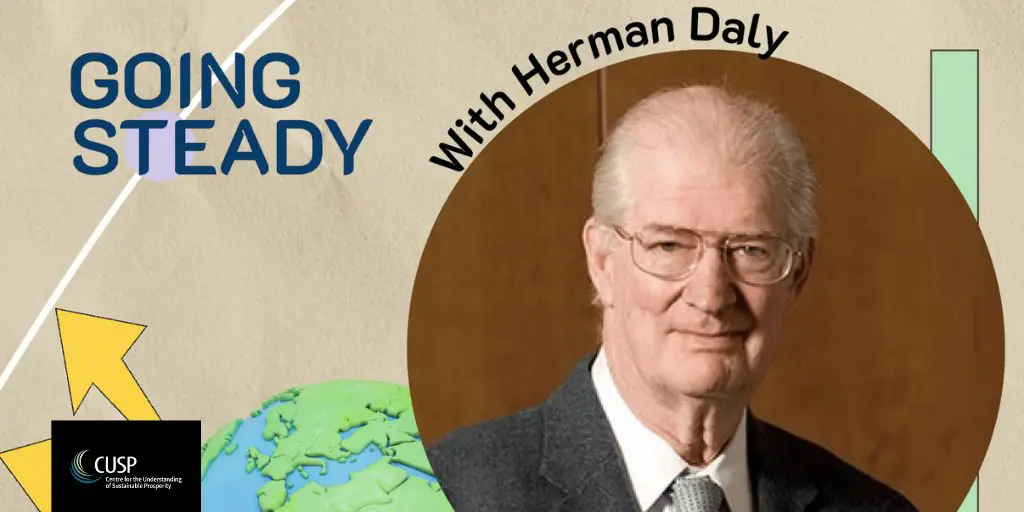
A special podcast series hosted by former Toronto mayor David Miller marks what would have been Herman Daly’s 87th birthday, exploring his life, legacy, and how his bold economic vision could help save the planet.

In his latest book The Care Economy, Jackson issues the powerful warning: our fixation on growth has come at the cost of the most vital parts of our lives—care, health, and human connection. In a world that undervalues care work and prioritises profit over people, what would it take to build an economy centred on wellbeing instead of wealth?

In this episode of The Deep Dive, host Phillip McKenzie speaks with Tim Jackson about his latest book, The Care Economy. The conversation examines how the pandemic and recent global conflicts have underscored care’s critical importance, yet revealed its consistent neglect within current economic systems focused primarily on growth and profit.
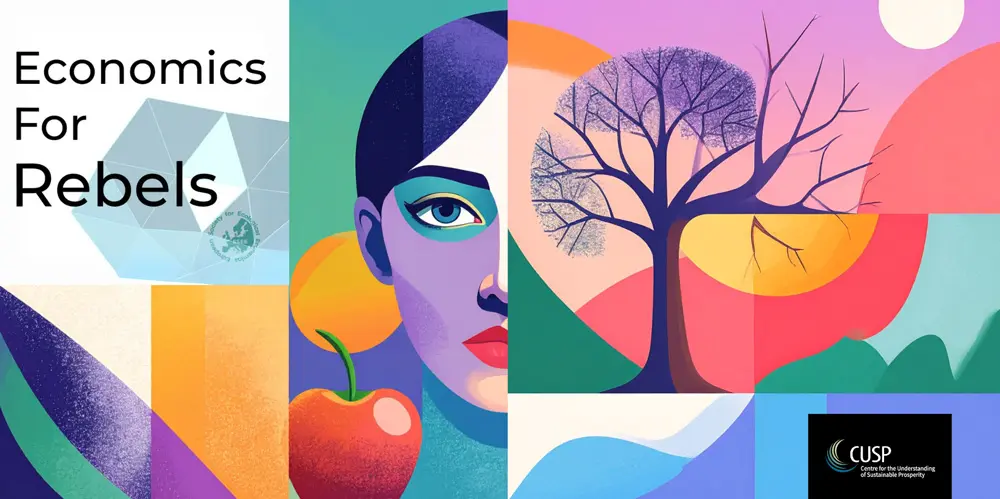
In this episode of the Economics for Rebels podcast, Tim Jackson speaks to Alexandra Köves about care as a philosophical principle and economic imperative—challenging the deep structures of a growth-driven patriarchal economy and its systemic neglect of wellbeing.
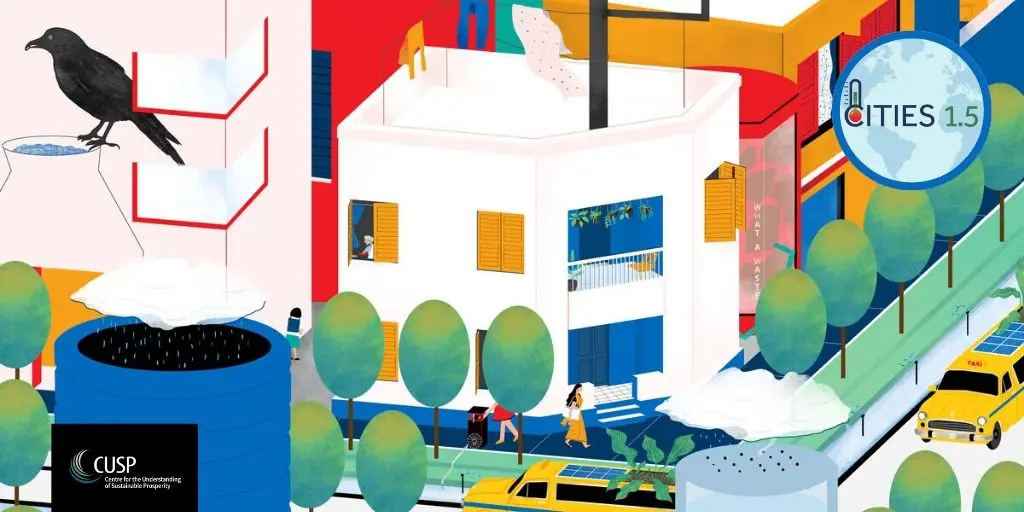
Tim Jackson joins Cities 1.5 to discuss his new book The Care Economy, arguing that redefining prosperity around care—not growth—offers a path to heal our economy, our healthcare systems, and the planet itself.
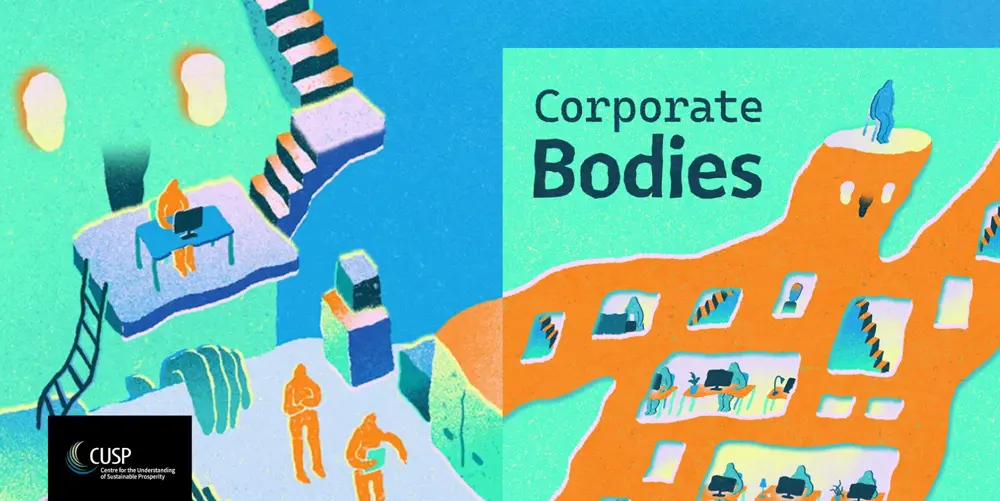
A podcast with Mark Walton and Kate Swade, exploring why organisations are so weird — and how we might make them better. Each episode dives into a different aspect of organisational life, with guests sharing personal insights into the quirks and challenges they’ve encountered.
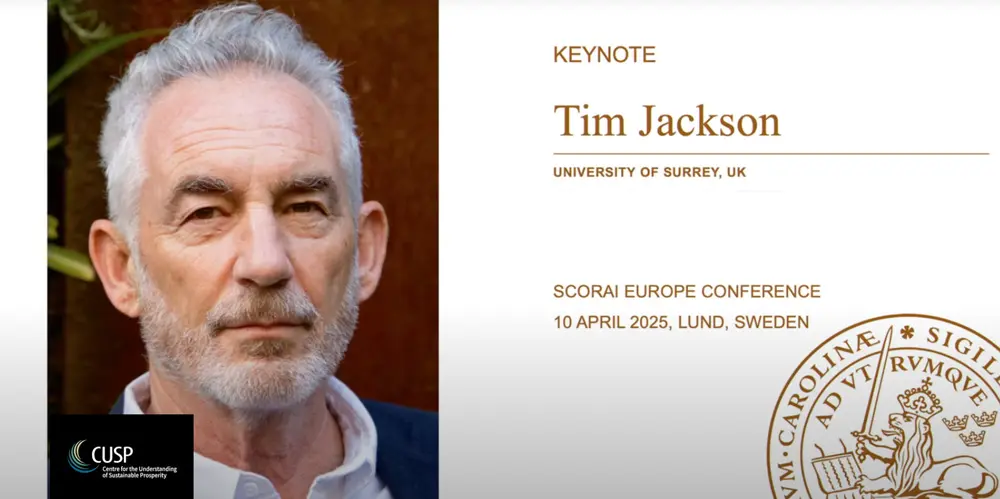
In his keynote for the SCORAI 2025 conference in Lund, CUSP co-director Prof Tim Jackson presented insights from his new book The Care Economy, calling for a shift from growth-driven models to economies centred on health, care, and creativity. His keynote exposed the systemic harms of perpetual growth and argued that prioritising care is essential for a just and viable future.
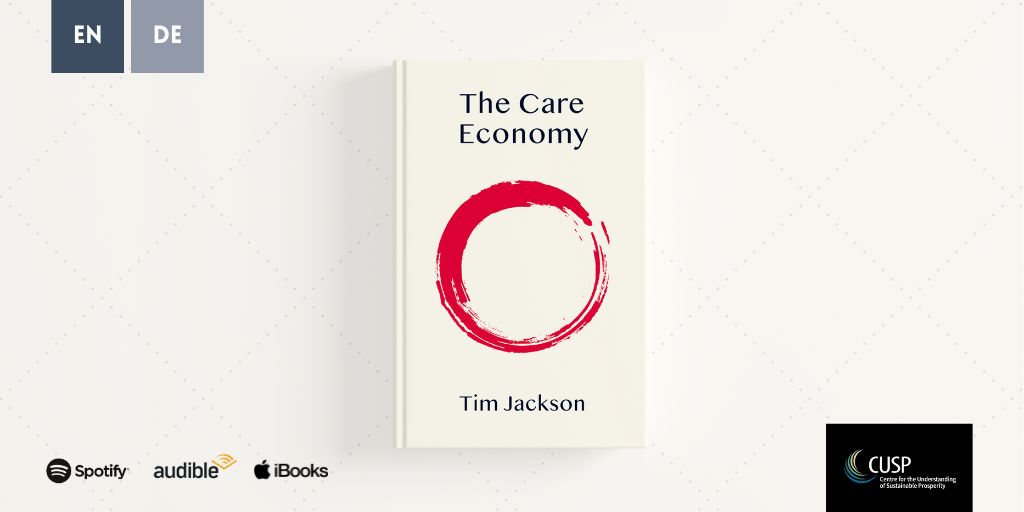
Forthcoming book by CUSP director Prof Tim Jackson, exploring the concept of care in the economy, its undervaluation in markets, and its profound importance for health and society. Dive into the history of medicine, capitalism’s impact on health, and the gender politics of care. Irreverent, insightful and profoundly inquisitive, The Care Economy offers a bold and accessible manifesto for a healthier and more humane society.

Climate change is raising questions about a central tenet of economics: growth. — Podcast with CUSP co-director Prof Tim Jackson discussing consumerism and the environment, and what Post Growth might look like.

For Greenpeace’s #SystemShift podcast, CUSP researcher Peter Victor explores the concept of ecological overshoot, delving into the complexities of ‘green growth,’ and grappling with the hurdles of achieving net-zero emissions on a global scale.
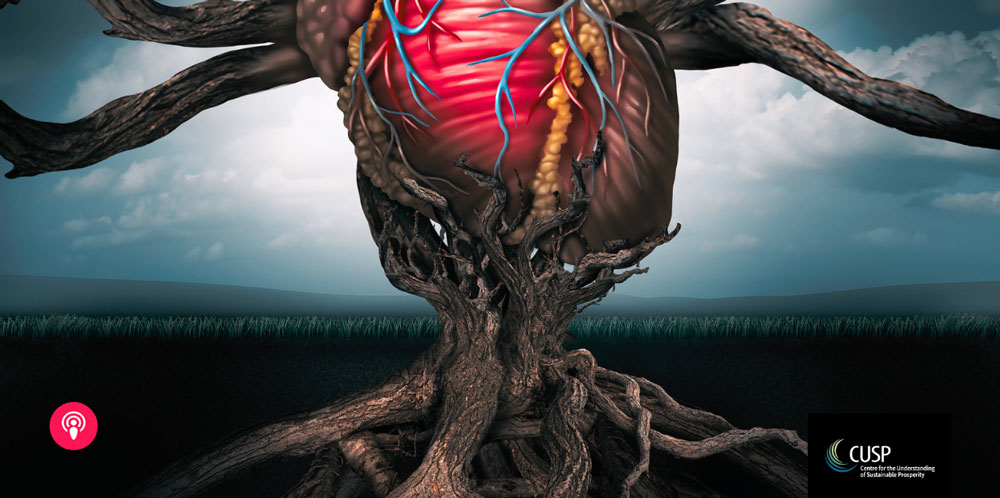
Mainstream critiques of postgrowth economics revolve around labour, with the common conception that a managed transition would be associated with unemployment and social instability. Ecological economics needs to address these questions and present a compelling story about what people’s jobs and lives could look like in a postgrowth world. Building on CUSP research, Ben Gallant and Sophus von Ermgassen discuss some of the options.
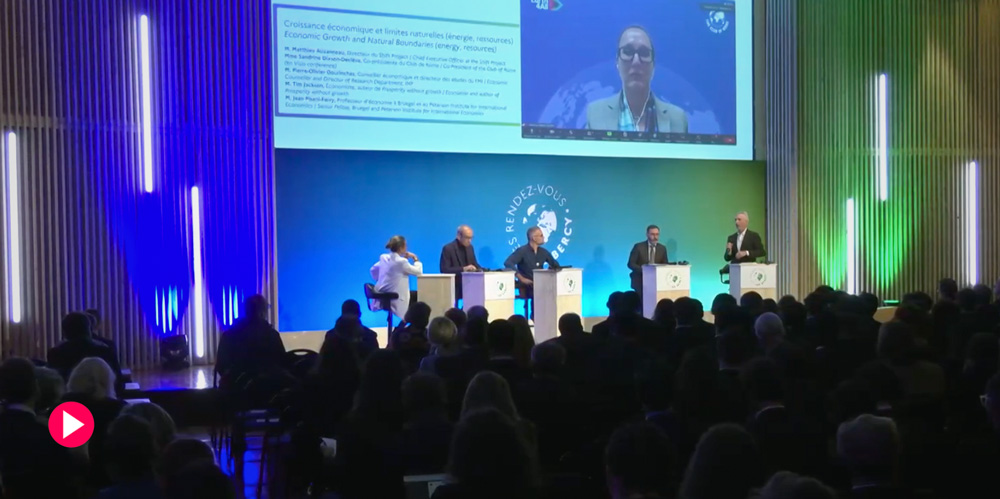
The French Ministry of Economy and Finance hosted a conference on 5 December to discuss the trade-offs between emission reduction policies and economic prosperity. Hosted by Minister Bruno Le Maire, speakers of the day included CUSP director Tim Jackson, Sandrine Dixson-Declève, Pierre-Olivier Gourinchas, and Bill Gates.
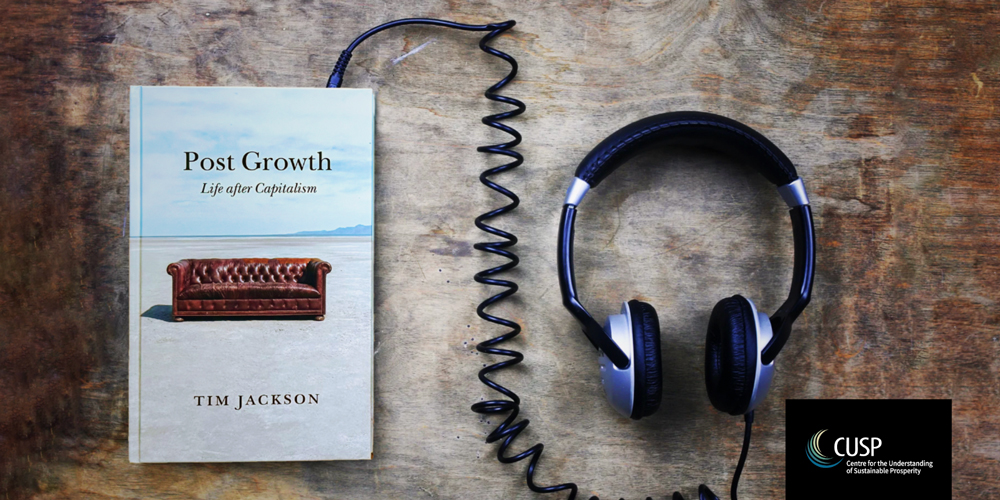
We are pleased to announce the release of the audiobook edition of Tim Jackson’s prize-winning book “Post Growth—Life After Capitalism”. Through his own narration, Tim brings a personal touch to the profound themes of Post Growth, offering an accessible and engaging experience for audiences to absorb his insights on the go.
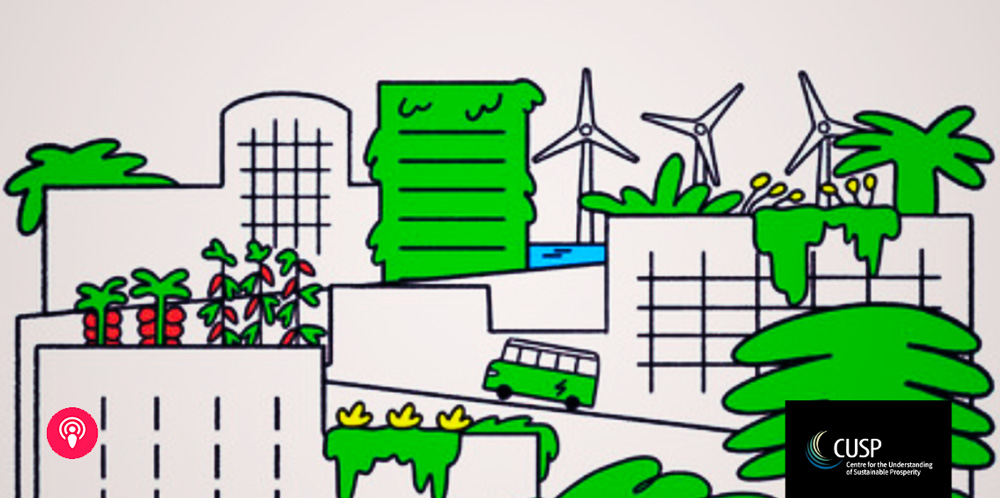
Hosted by the former Mayor of Toronto, David Miller, this Cities 1.5 podcast with Tim Jackson is looking to translate the theoretical into the practical, by discussing what cities can do to deliver shared prosperity—not just an unsustainable goal of infinite growth.
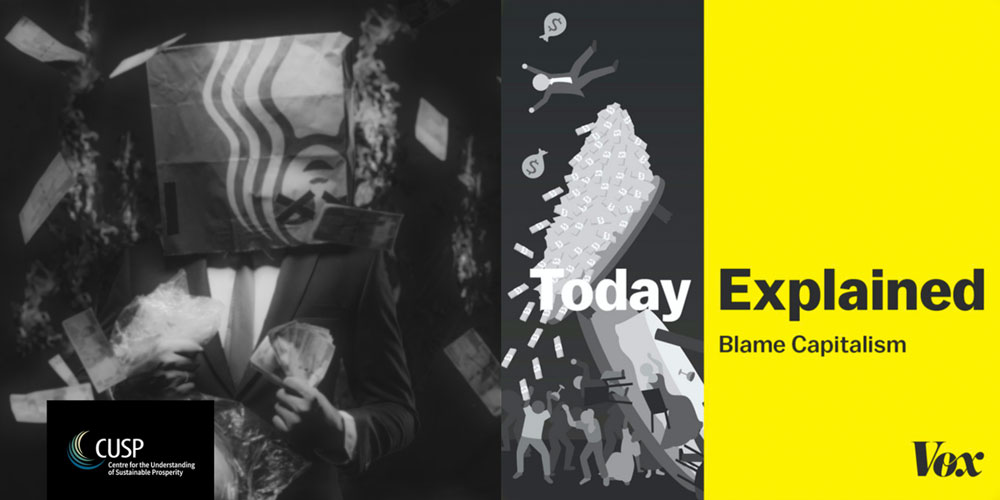
Vox.com podcast series with CUSP Director Tim Jackson investigating the ailing capitalist model in the US, and how postgrowth economics and policy making is coming into play.

Bringing together practitioners and academics, this workshop aim to co-create an improved understanding of the role of post growth and degrowth for business and society, what it means for organisations, and what the challenges are for welfare provision.
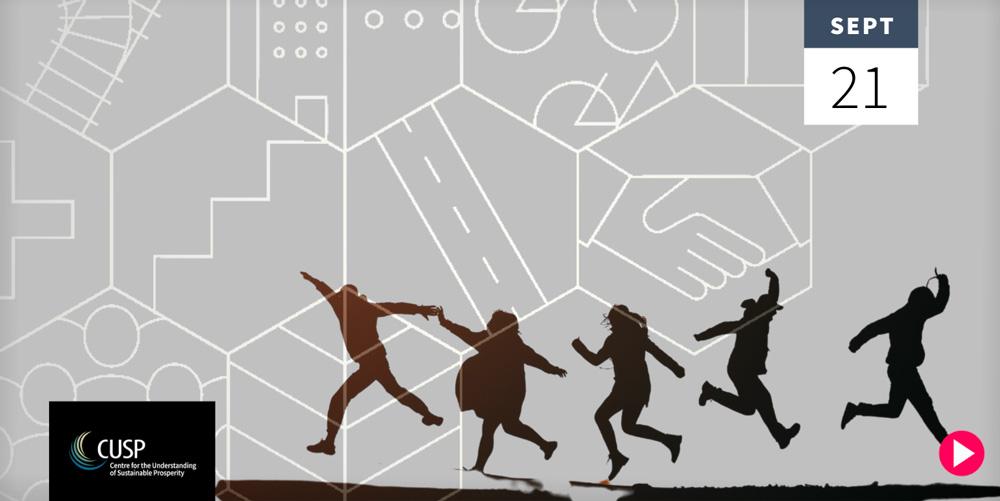
In this seminar, Dr Elisabeth Dütschke presents findings from her European research project FULFILL which investigated current lifestyle patterns using qualitative and quantitative data.
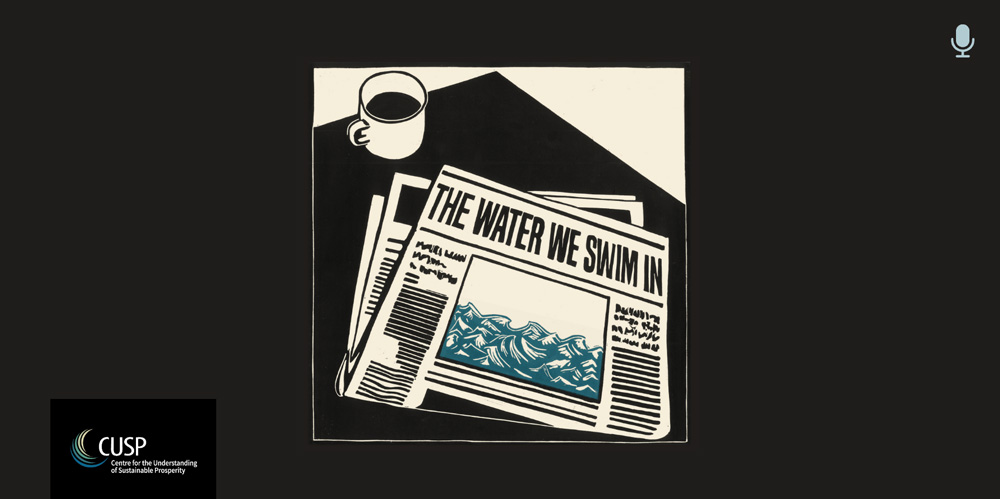
With contributions from CUSP researchers Tim Jackson, Peter Victor and Simon Mair, this gripping new narrative podcast series is tackling big questions in playful ways: What does system change actually mean?
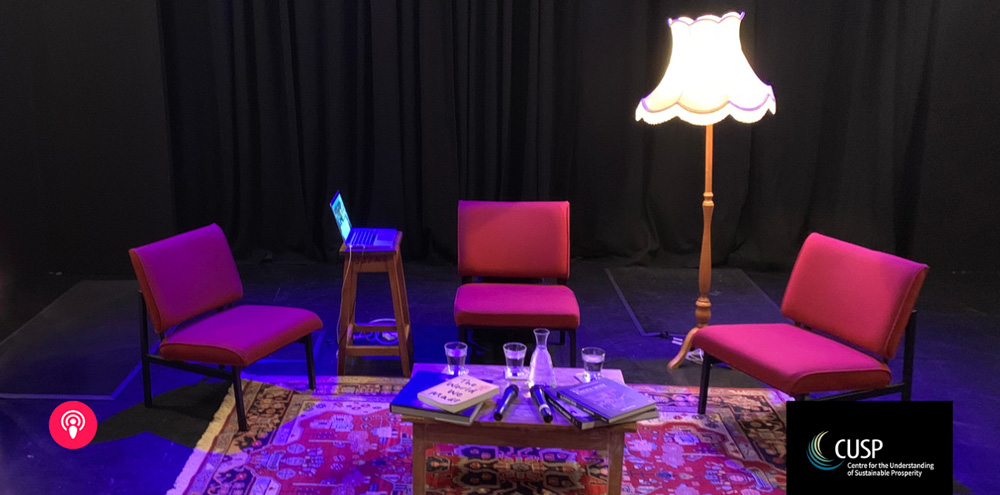
While we need less growth to put less demand on the planet’s resources and slow down climate change, CUSP director Tim Jackson argues that we need more art, more plays and works of fiction to bring both sides of that argument to life.
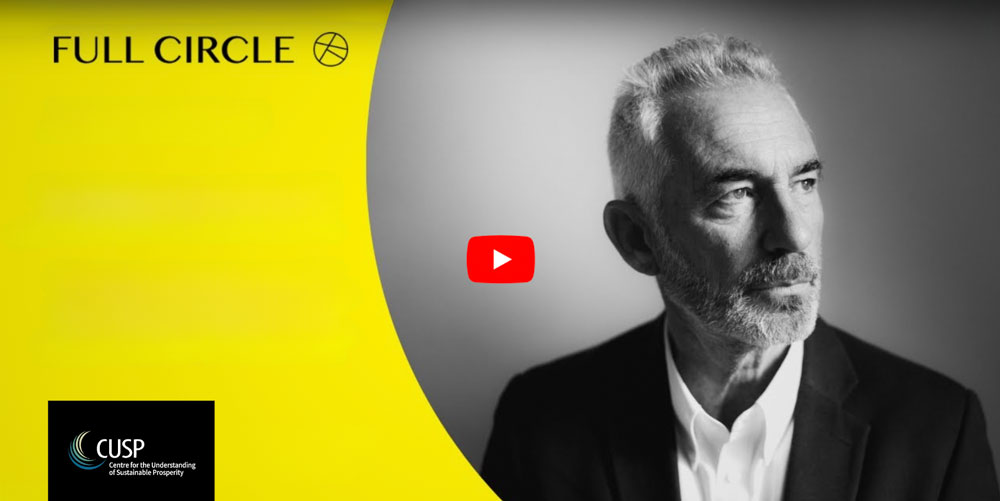
To provide prosperity for all while respecting planetary boundaries, it is imperative we transcend both the conventional growth-centred worldview and our growth-dependent economic and social systems. Tim Jackson explores how to get there.
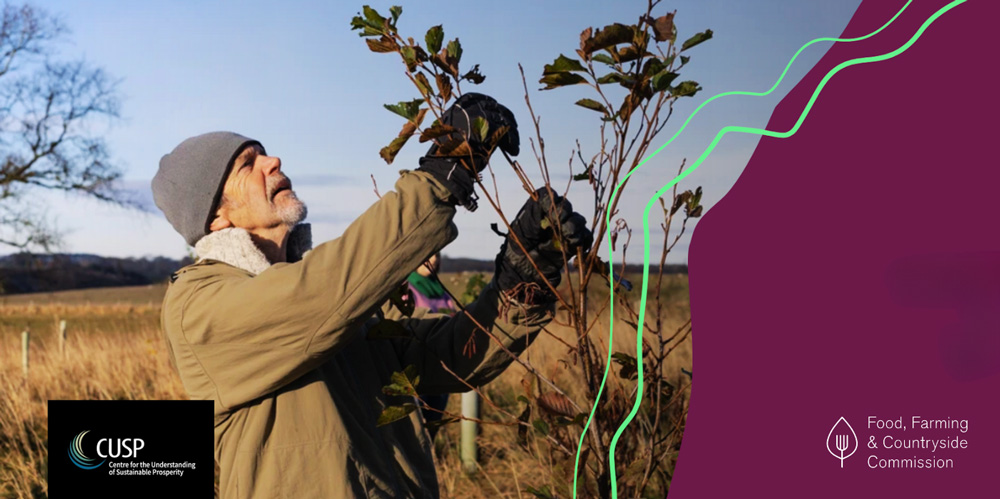
Written by CUSP researchers Fergus Lyon and Amy Burnett, this report for the UK Food, Farming and Countryside Commission seeks to understand how new and emerging markets in natural capital fit into a changing landscape for farmers.

On 15-17 May 2023, scientists, politicians, policymakers and civil society organisations gathered in Brussels for the second Post-Growth Conference for Europe. The event is a cross-party initiative of 20 Members of the European Parliament, supported by a wide-range of partner organisations.
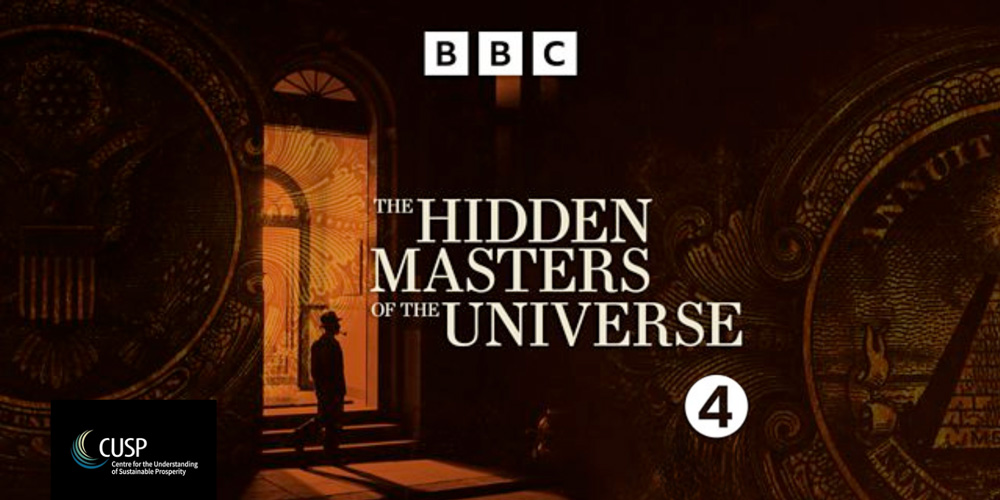
BBC Radio 4 documentary with CUSP researcher Christine Corlet Walker, discussing her research into private equity ownership in UK care homes.
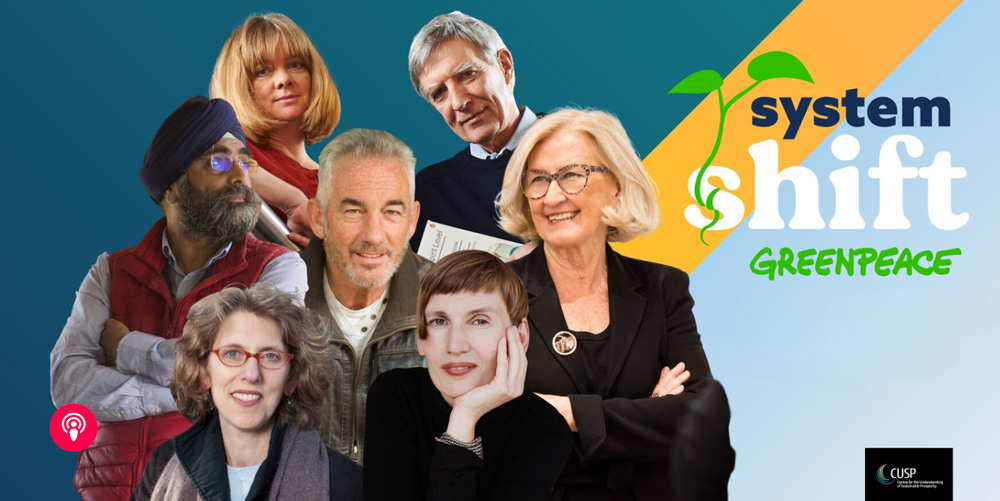
For Greenpeace’s new #SystemShift podcast, Tim Jackson joins former Swedish politician and Green MEP, Carl Schlyter, to discuss the myth of ‘eternal economic growth’, the need for rethinking measures of progress, and the pressing issues of energy, employment, inequality.
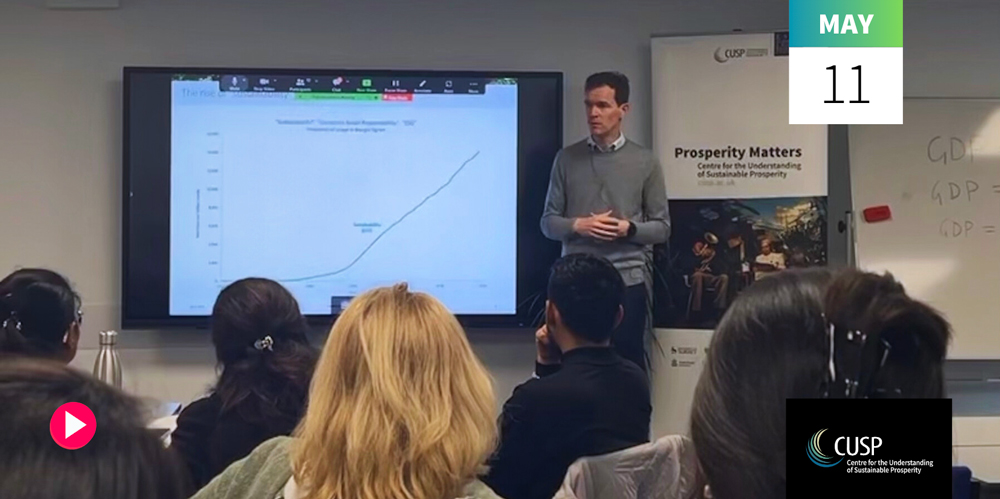
For the last two decades, a ‘win-win’ sustainable investment paradigm has offered the promise that we might solve global ecological challenges in ways that lead to market-beating financial returns. But twenty years after this strategy first took hold, progress on climate and ecological challenges is proving painfully slow.
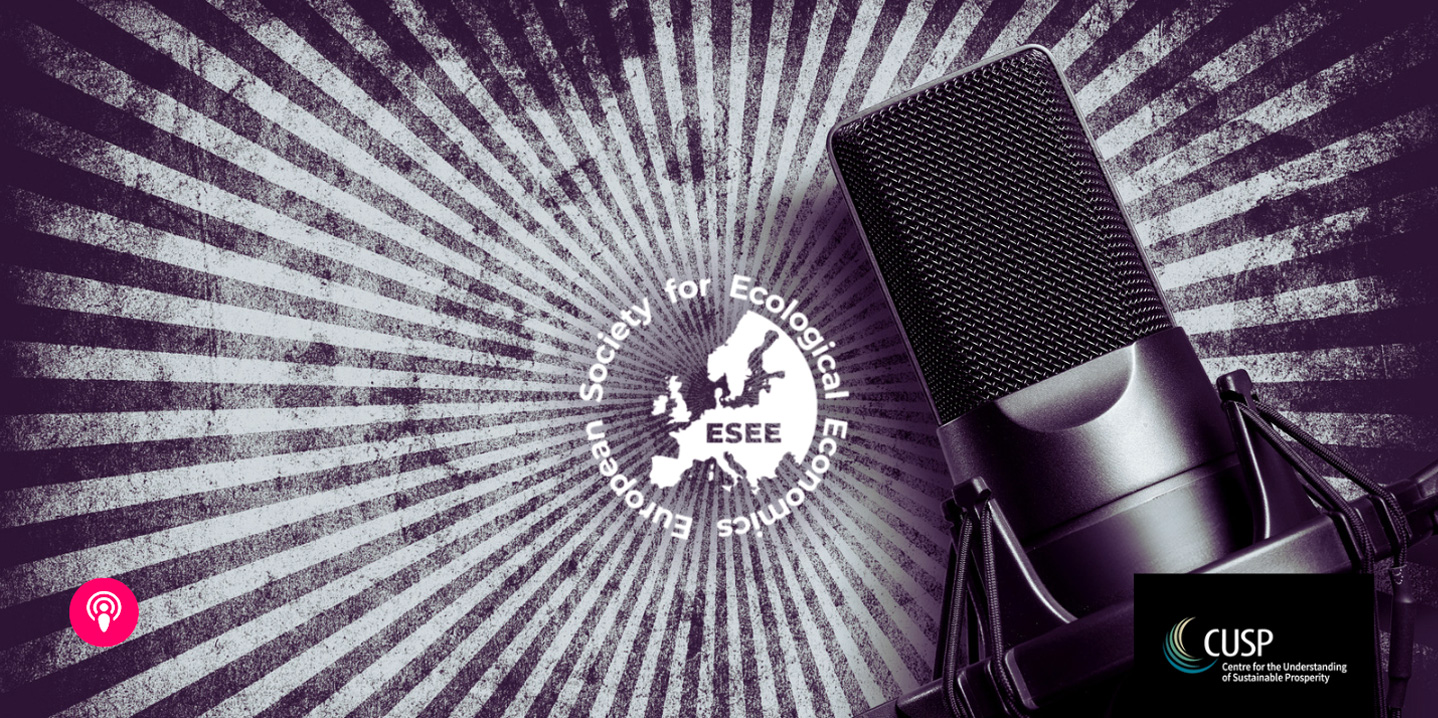
Ecological economists integrating ecological and critical social perspectives have long been working on ideas to bring about just sustainability transformations. This podcast aims at communicating post-growth ideas in order to open them to critical discussion, from global problems to people’s everyday lives.
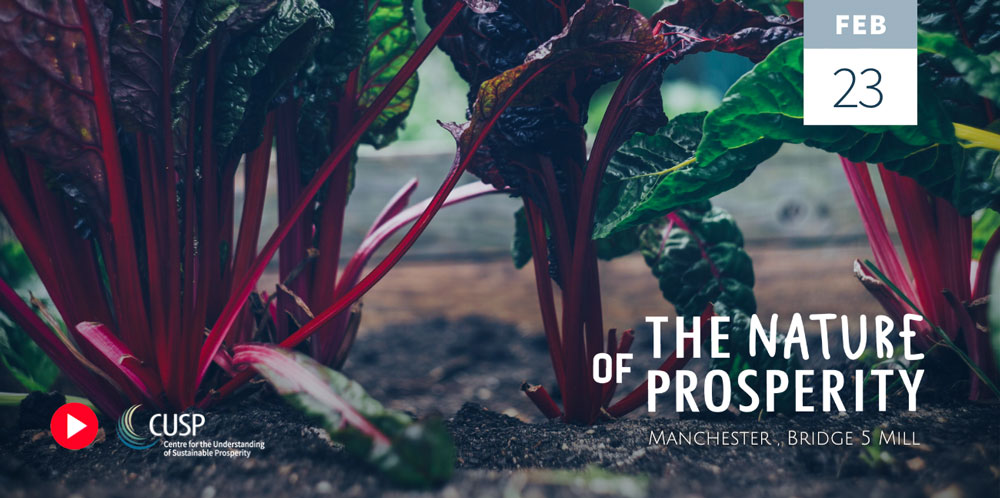
The 7th event in our Nature of Prosperity dialogue (held under the patronage of Dr Rowan Williams) will explore how community level innovations can tackle health, affordability and sustainability in our food systems.
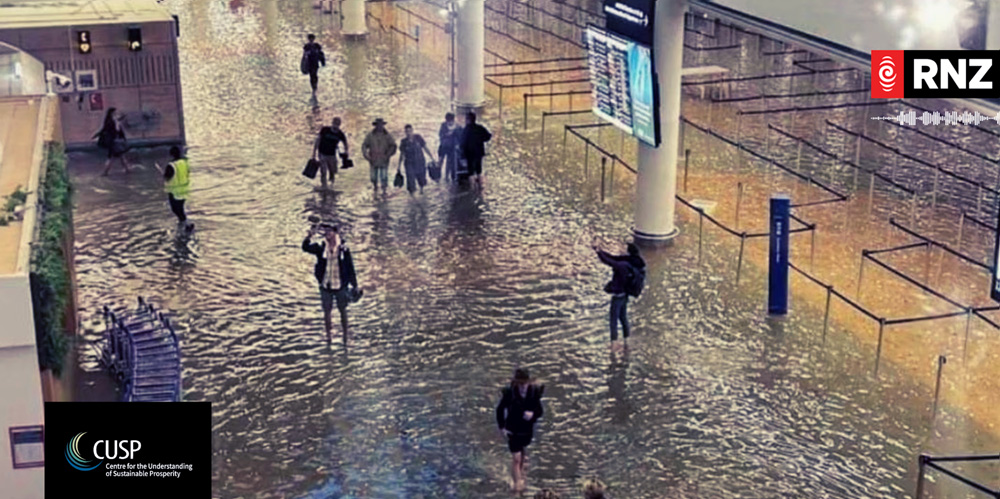
CUSP director Tim Jackson was invited onto the Radio New Zealand Saturday Morning programme with Kim Hill, to discuss post-growth economics, staggering inequalities legitimated by the trickle-down ideology, and the motivation for his most recent book Post Growth—life after capitalism.
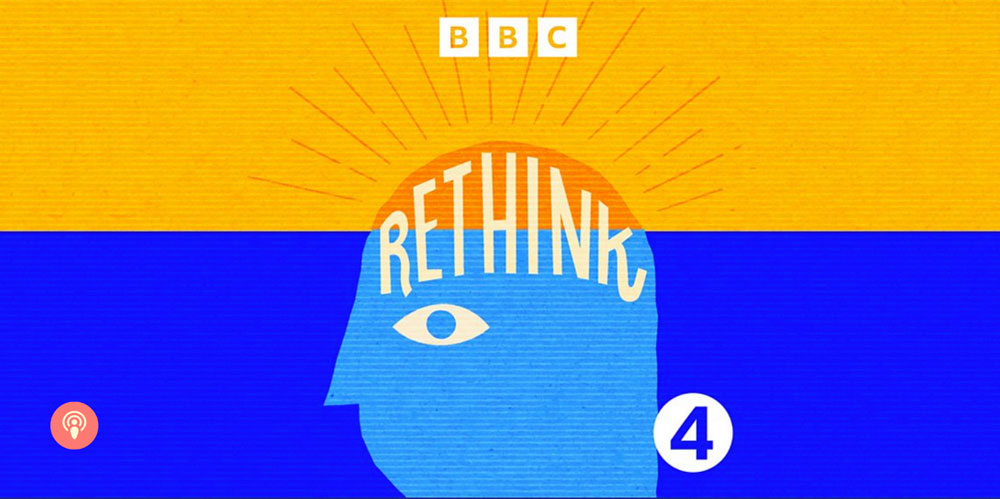
What may switching to a green economy mean for the way we live and work and is it compatible with economic growth? Together with his invited guests and co-hosts, Amol Rajan is exploring key questions around money, prosperity and the green economy.
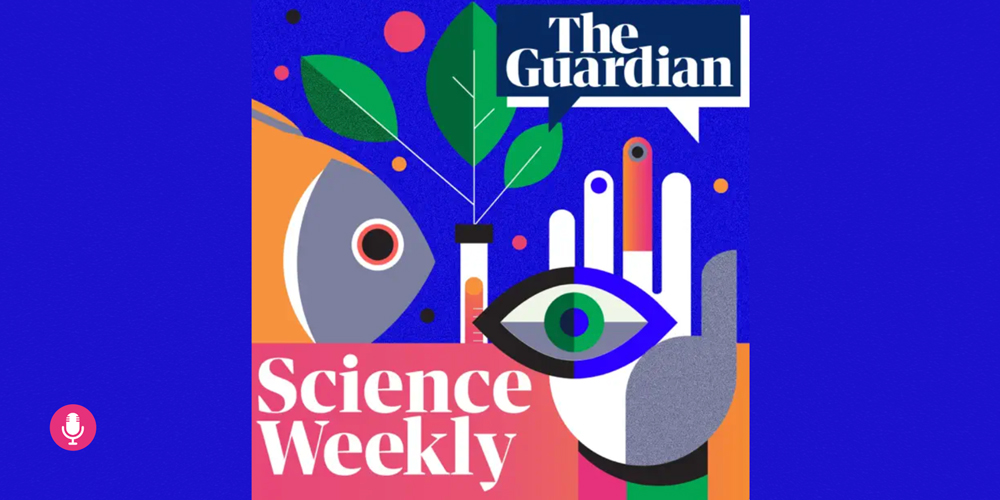
In the Cop27 special, Ian Sample speaks to Tim Jackson about the myth of eternal growth, other ways to think about progress and prosperity, and what an economic system in balance with our planetary system might look like.

As the twin storms of economic turmoil and worsening climate change grip the the world, BBC Radio 4 Analysis examines the future of economic growth. Does it offer a route out of economic malaise, or have its benefits reached a ceiling for developed countries?
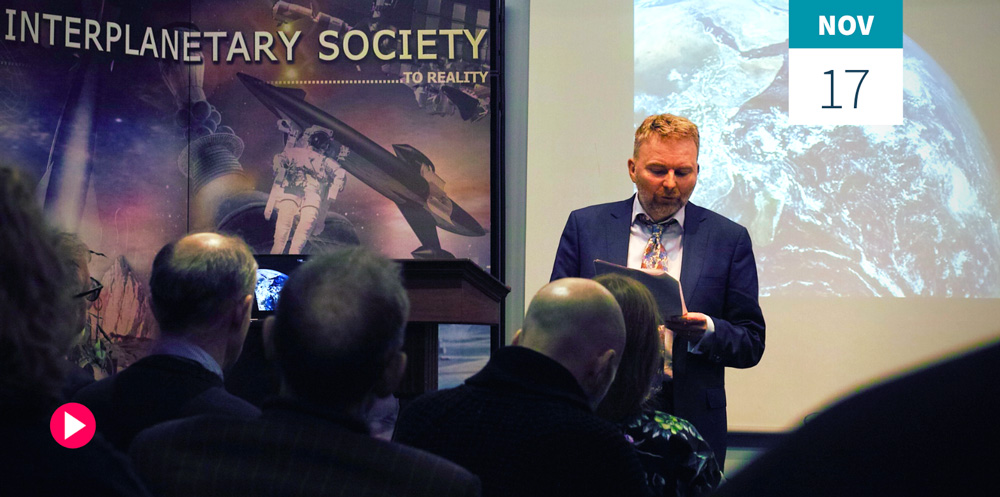
Marking the fiftieth anniversary of the last Apollo mission to the Moon—exploring its legacy for environmental consciousness and human self-understanding. In this event, CUSP researcher Richard McNeill Douglas explores the intellectual legacy of these momentous events from fifty years ago—and the surprising linkages that connect them.
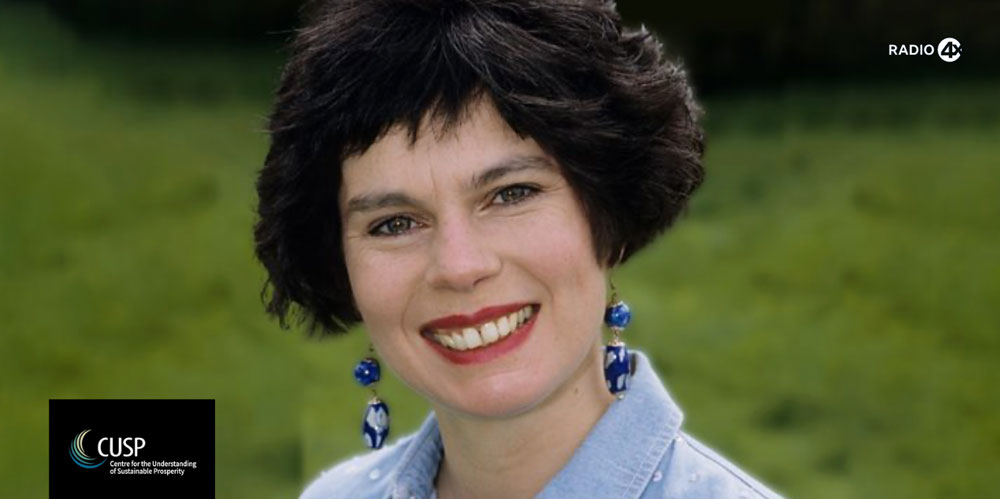
First broadcast twentyone years ago on BBC Radio 4, Tim Jackson’s 10-episodes drama series given new lease of life on BBC Radio4Extra and BBC Sounds | October 2022
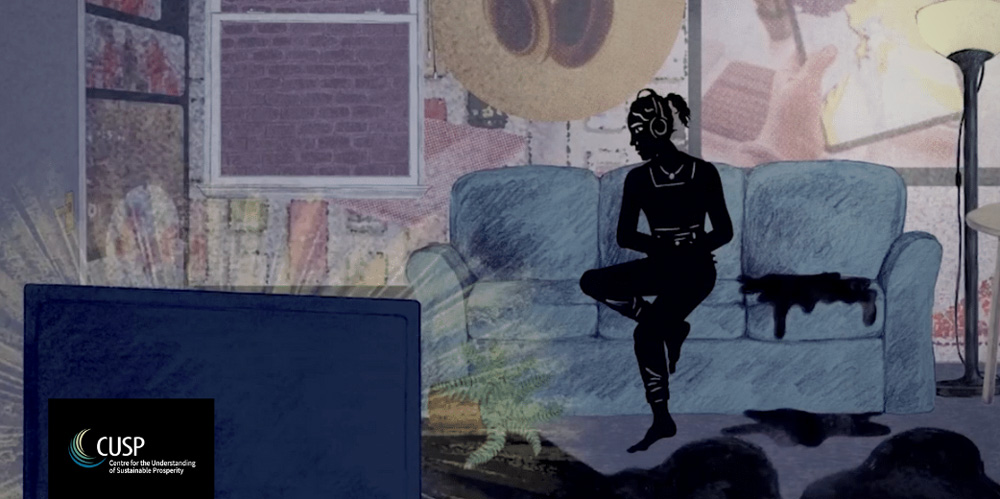
Anxiety and depression are on the rise, especially amongst young people. A response to consumer capitalism, climate breakdown, and the cost-of-living crises? A new short-film animation is looking at the links.
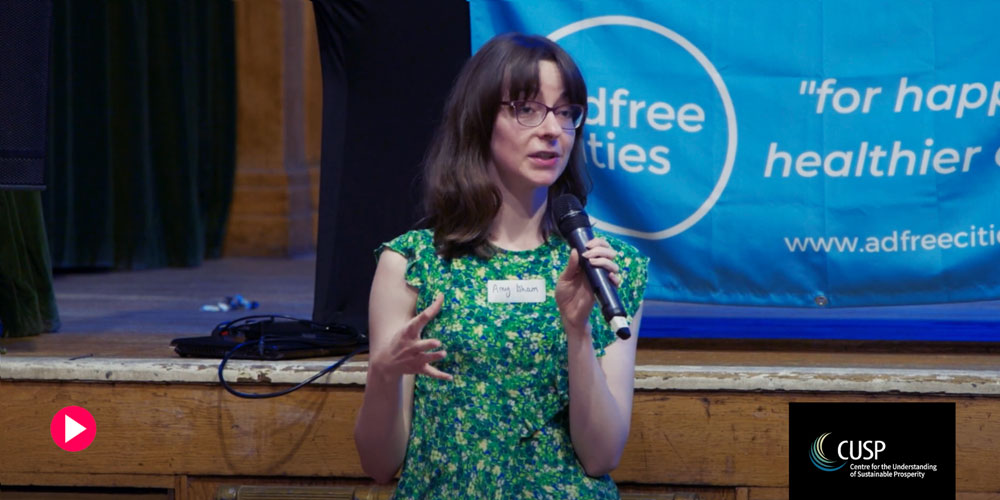
What is ‘post-consumerism’ and how do we get there? What are the values underpinning it? And what are its implications for late stage capitalism and the growth economy?—Dr Amy Isham presenting CUSP research on the role of materialistic values in the pursuit of sustainable wellbeing.
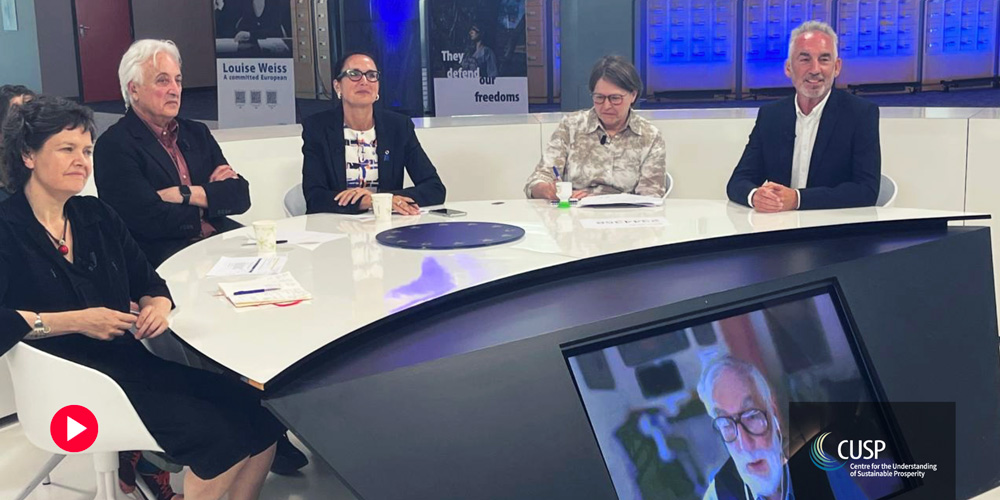
Roundtable event with Dennis Meadows, Robert Costanza, Kate Raworth, and Tim Jackson; contributing to the theme of post-growth thinking within the EU institutions and across EU Member States.
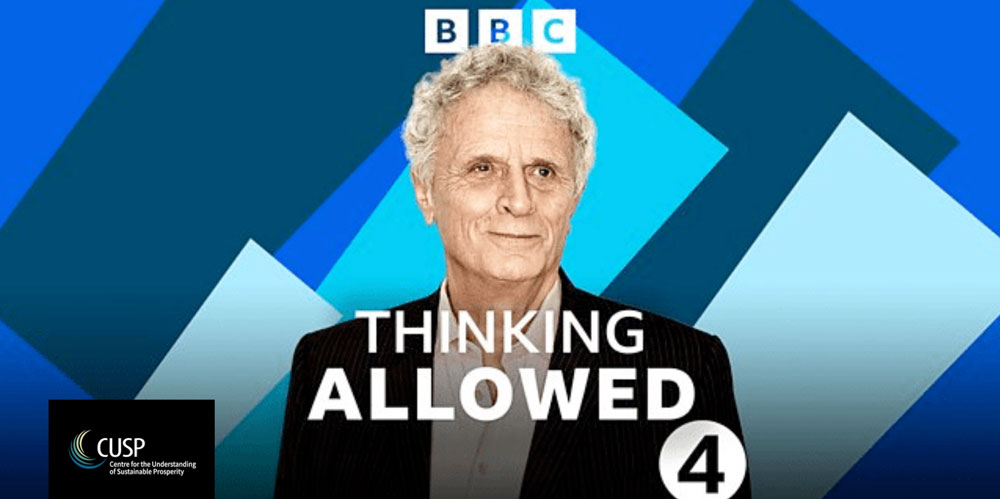
CUSP co-investigator Will Davies speaking to Laurie Taylor about his new book Unprecedented, written together with Sahil Jai Dutta, Nick Taylor and Martina Tazzioli; exploring the impact of the pandemic on our working and home lives.
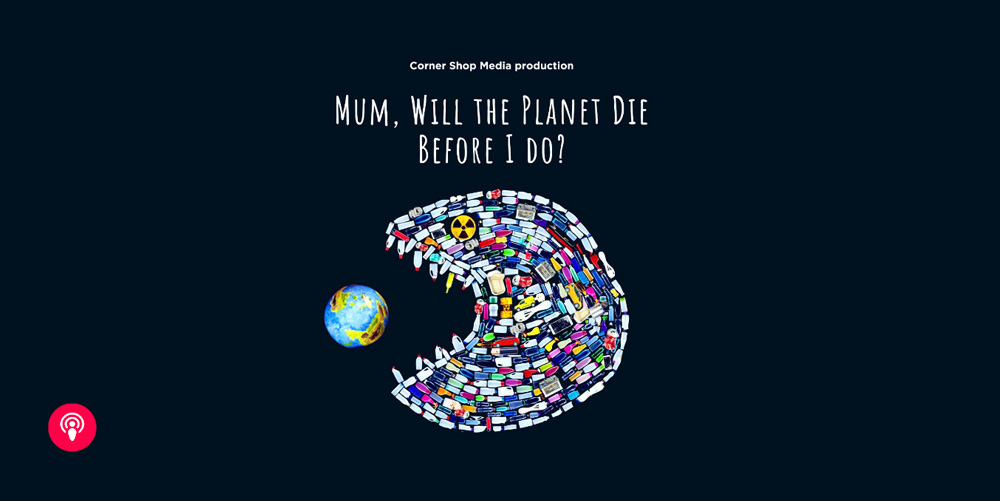
CUSP partnering with Corner Shop Media for a new podcast series, exploring our role as parents and carers in tackling the climate crisis. New episodes each Thursday.
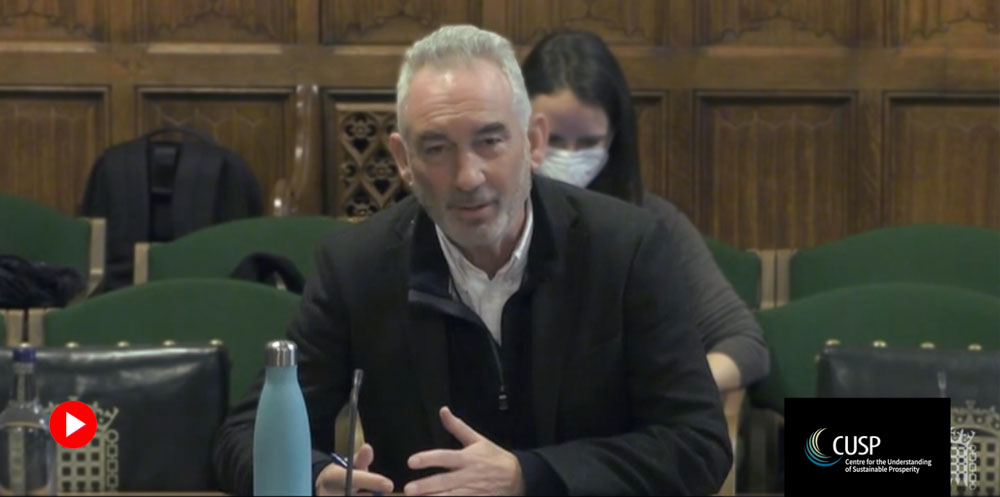
On 9 February 2022, CUSP director Tim Jackson gave oral evidence to the Environmental Audit Committee on their beyond GPD inquiry, addressing questions around growth dependency and the limitations of the ‘inclusive wealth’ concept.
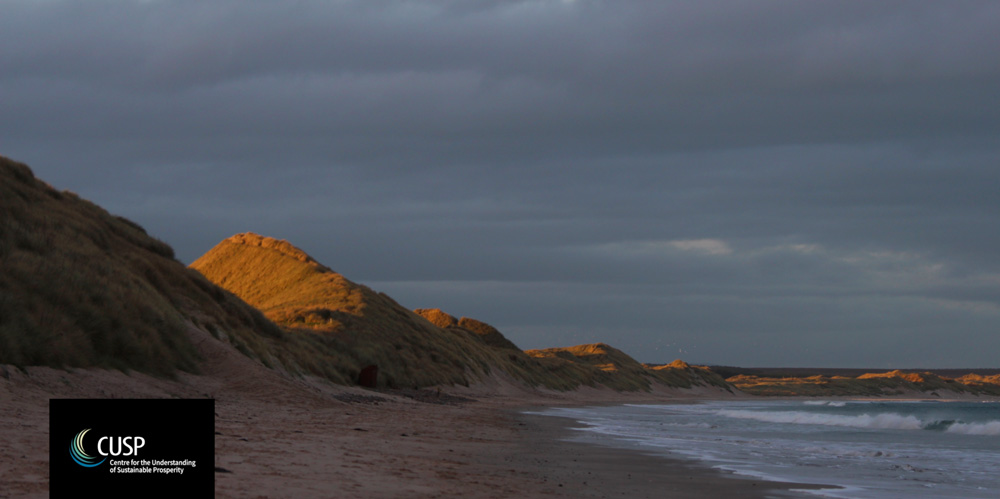
A blog and film to account for Malaika Cunningham’s and The Bare Project’s residency at Lyth Arts Centre in Caithness—offering the sketched beginnings of the giants they discovered in their time there.
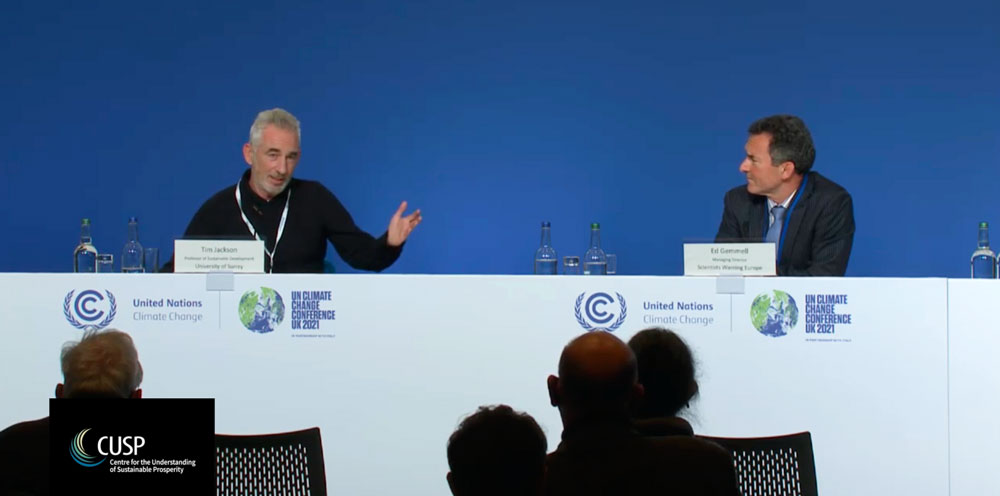
Press conference with Tim Jackson at the 2021 UN Climate CHange Conference, discussing zero carbon sooner, post-growth economics and #COP26 challenges. Hosted by Scientists Warning Europe, 5 November 2021.
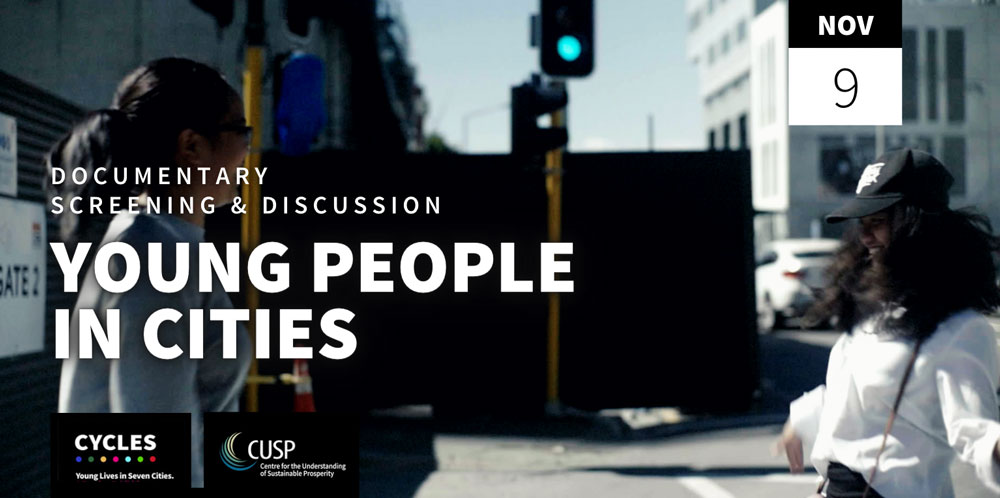
Hosted by the University of Surrey (UK) in partnership with Canterbury University (New Zealand) as part of the 2021 ESRC Festival of Social Science—this event will offer audiences an opportunity to watch the preview of two new short films which gives insights into young people’s lives in Christchurch, New Zealand and Makhanda, South Africa and to talk to the film director and research project leads.
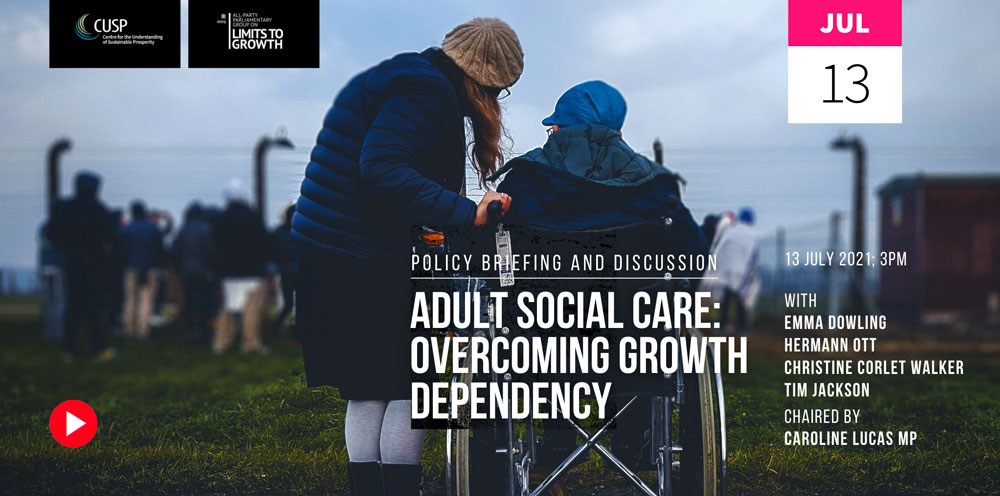
Join us for the launch of a new policy briefing on overcoming the growth dependency in the welfare system. Drawing on in-depth interviews with economists, policymakers and practitioners in social care and other parts of the welfare system, we will discuss a new paper in our An Economy That Works series for parliamentarians , looking specifically at adult social care.
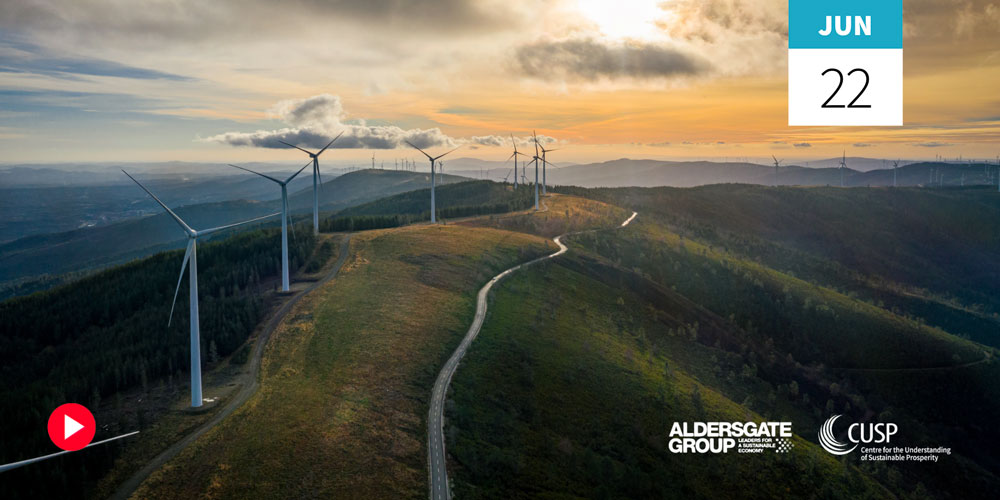
This event launched CUSP’s and Aldersgate Group’s new report, Financing the future: Driving investment for net zero emissions and nature restoration, which explores the critical role of green finance in delivering the UK’s net zero and nature restoration targets, levelling up agenda, and economic recovery.
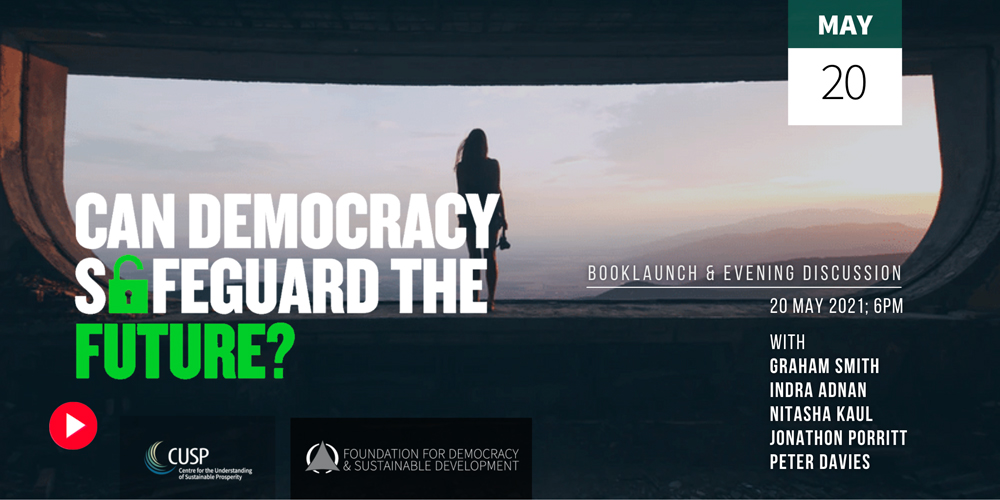
The evening event will mark the launch of the new book by Prof Graham Smith: Can democracy safeguard the future? Graham asks why democracies repeatedly fail to safeguard the future. He sets out ways of reshaping legislatures and argues that forms of participatory and deliberative politics should be at the centre of the democratic response to protecting the interests of future generations.
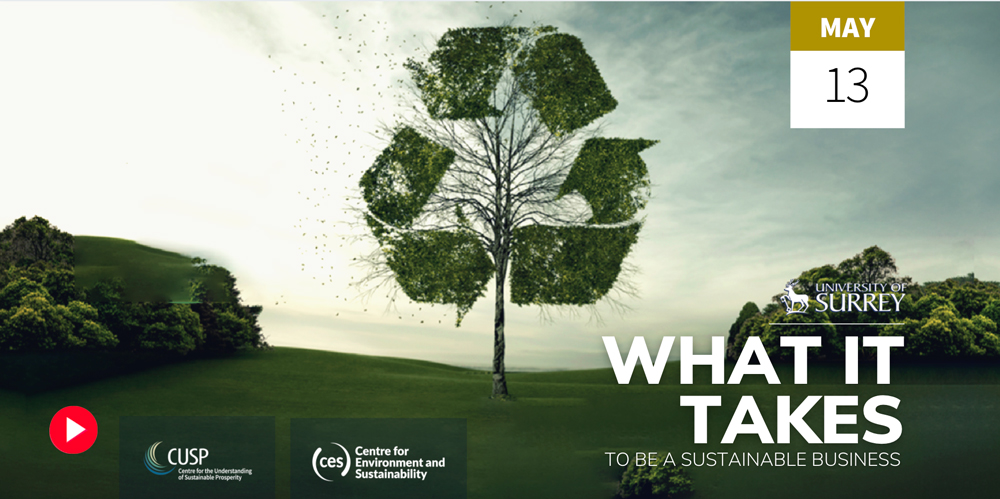
You are cordially invited to an event co-hosted with the University of Surrey as part of the What it takes series, focusing on what it takes to be a sustainable business. In this event, we speak to Surrey alumna and Global Sustainability Director at Diageo, Dr Kirstie McIntyre, as she shares her own considerable experience in the field.

In this short video from Al Jazeera, CUSP Director Tim Jackson breaks down some of the lessons learned from the pandemic, as pressure builds to fix devastating economic inequality.
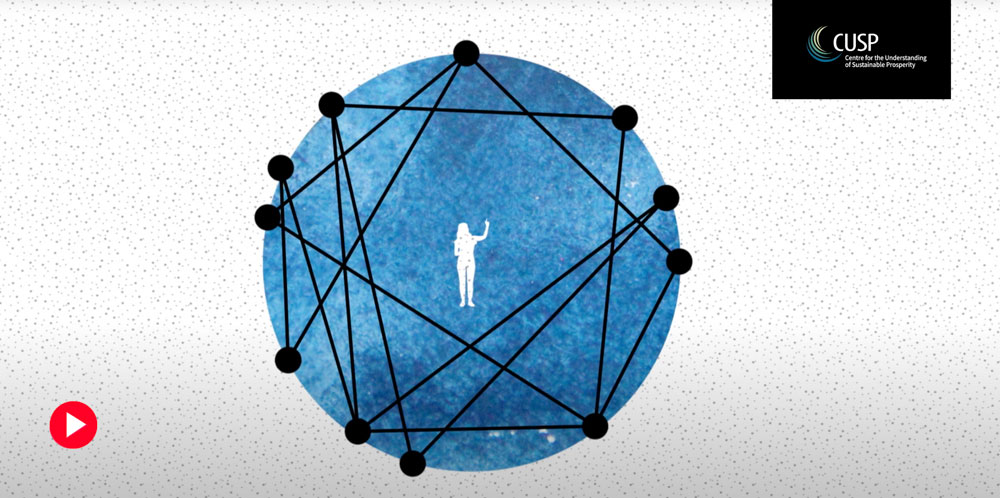
Inspired by his article ‘What Will The World Be Like After Coronavirus?’, film makers Bryony Simcox and George Webster talk to CUSP researcher Simon Mair about Ecological Economics; and how we might imagine futures which are more just and fair, drawing in concepts from i.a. Kate Raworth’s Doughnut Economics.
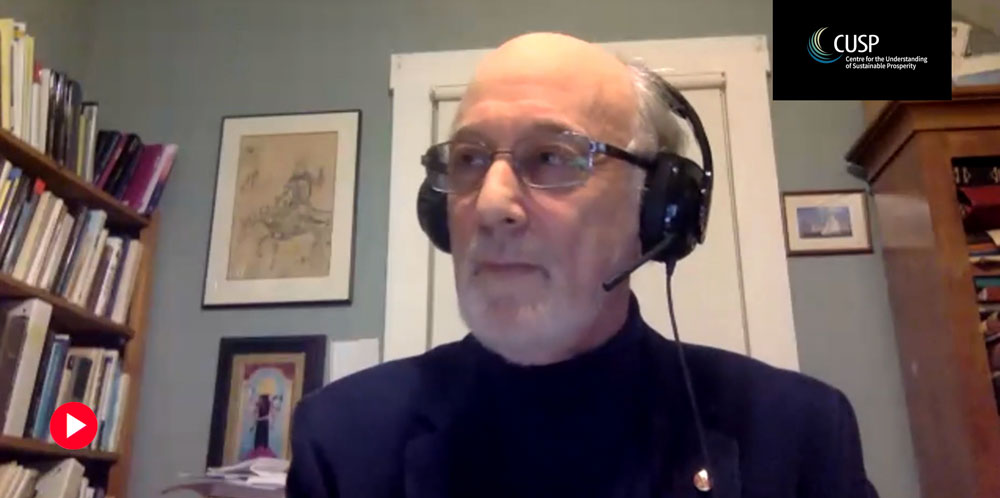
CUSP co-investigator Pro Peter A Victor presenting longstanding work on why long-term economic growth isn’t feasible or desirable and how human economies are the key to saving the planet. Welcome by Cecilia Point, Musqueam Nation.
The annual Gideon Rosenbluth Memorial Lecture is presented by the CCPA-BC and the Vancouver School of Economics at UBC.

Special meeting, co-hosted by the APPG on the Green New Deal and the APPG on Limits to Growth, ahead of the budget on 3rd March explores a range of the options available to the Chancellor. Speakers are Lord Adair Turner, Miatta Fahnbulleh, Dr Suzy Morrissey and Robert Palmer; chaired by Caroline Lucas MP and Clive Lewis MP.
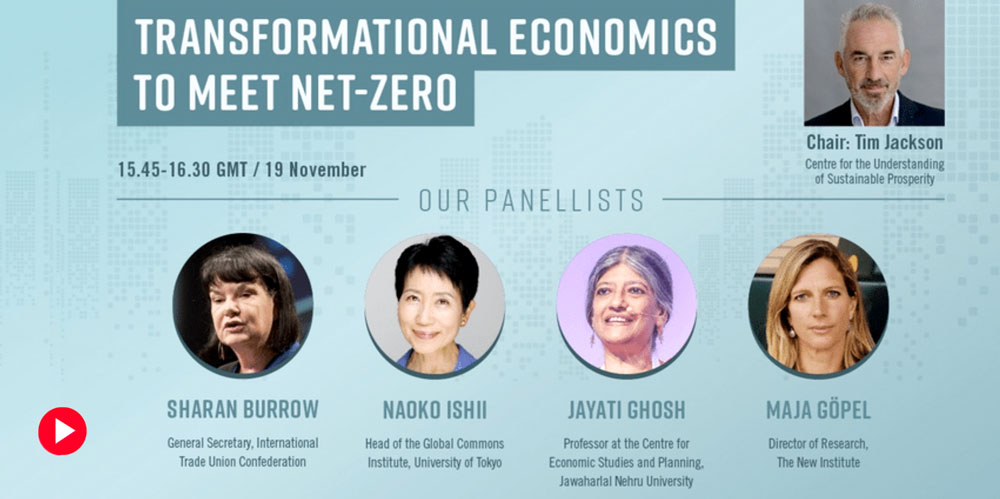
The next decade will see the fastest economic transformation in history. Who is leading this transformation? How do we accelerate action? On the last day of the Race To Zero Dialogues 2020, the Club of Rome and the Potsdam Institute hosted a closing session, that marked the end of a ten-day series of virtual dialogues, with the objective to build momentum around the shift to a decarbonised economy ahead of COP26.
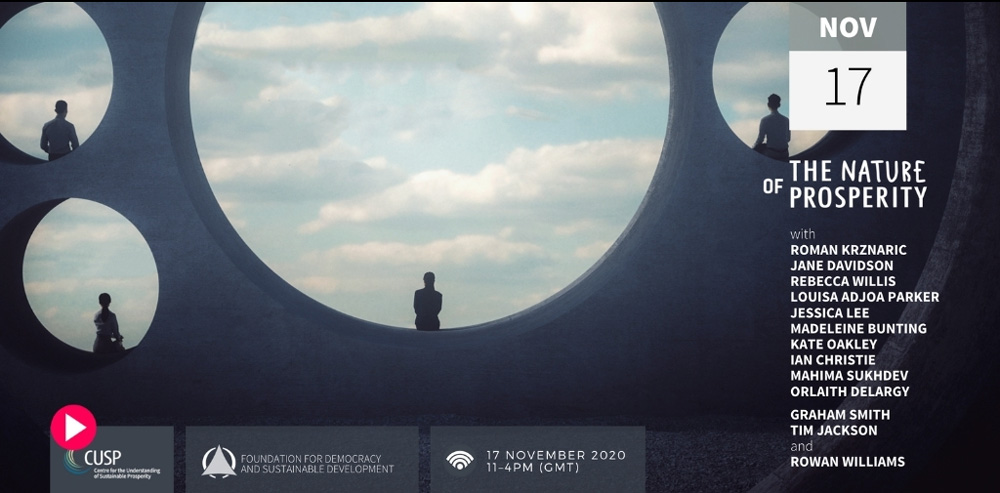
How can we nurture visions of the good life that preserve nature and protect the interests of future generations? Can new institutions help us to re-invigorate democracy? Can creativity inspire us to conserve what we love? How can we become the ‘good ancestors’ we would wish for our kids, in the world they will inherit?

The possibility that we can live better, healthier and more fulfilling lives without the relentless consumption that damages the planet was one of the points of discussion when BBC presenter Nihal Arthanayake invited CUSP Director Tim Jackson and Policy Exchange analyst Benedict McAleenan to discuss the implications of Sir David’s remarks on Radio 5 Live’s Afternoon Edition today. Good lives don’t have to cost the earth. It’s time for capitalism to recognise that.

Millions have been left without work as the coronavirus pandemic continues to devastate economies across the globe. How does surging unemployment complicate the global response to the pandemic? Dan Damon and a panel of experts discuss what should be done for the BBC World Service.

The climate emergency calls for innovative solutions that allow for a just transition. This will be the focus of the #ISIRC2020 research conference theme led by CUSP Deputy Director, Fergus Lyon with Irene Garnelo-Gomez and Rafael Ziegler. The call for papers on “Sustainability and Social Innovation in a Time of Climate Emergency” is open until 20 March 2020.
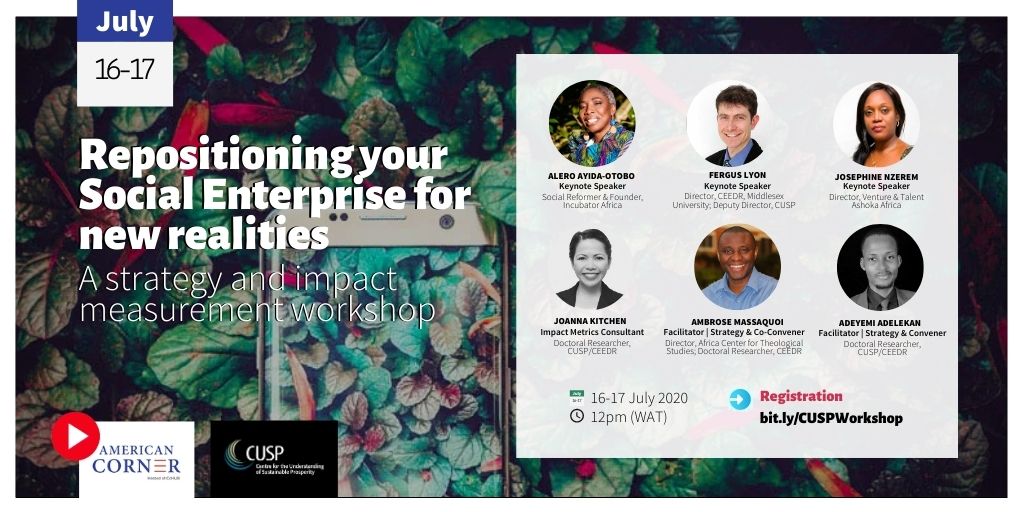
With the long-term impact of the current crisis on global economies yet to be understood, a vast number of social enterprises are likely to suffer after the lockdown due to severe constraints to their operations. What will this mean for alternative business in Nigeria and how do you prepare your organisation for this new reality? This virtual workshop will help social entrepreneurs reflect on their strategies.

Panel discussion with CUSP Director Tim Jackson, Maria Joao Rodrigues (Foundation for European Progressive Studies), Apollonia Miola (OECD) and Meera Ghani (ECOLISE); hosted by Peter Schmidt (EESC).

Set out to engage MPs across the political spectrum, the online discussion was chaired by Krishnan Guru-Murthy (Channel 4), and expertly deliberated on the prospects for a socially and environmentally just economic recovery—which takes into account not only the need to prevent the worst of climate breakdown, but does so in a way that sustainably strengthens the wellbeing of people. Discussants were CUSP director Prof Tim Jackson, Prof Mariana Mazzucato (UCL), Sir Prof Michael Marmot (UCL) and Sir David King (former Government Chief Scientist).

On 12 February this year, a number of student groups within Cambridge University’s Christ’s College hosted a panel with alumni of Christ’s to share their expertise on various aspects of the divestment issue, addressing i.a. economic, historical, and moral perspectives for divestment. Chaired by Alyssa Gilbert, panellists include Tim Jackson, Fiona Harvey and Rowan Williams.
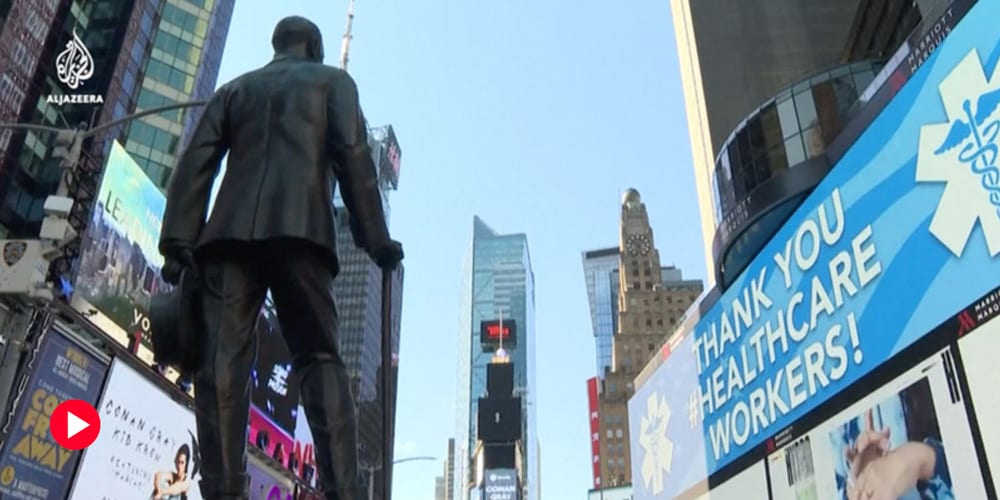
Al Jazeera ‘Start Here’ programme with CUSP director Tim Jackson, taking an international view on the COVID-19 health and economic crisis—and where to start to ‘build back better’. Other discussants include the South African Shadow Health Minister Siviwe Gwarube, and Allam Ahmed from the World Association for Sustainable Development.
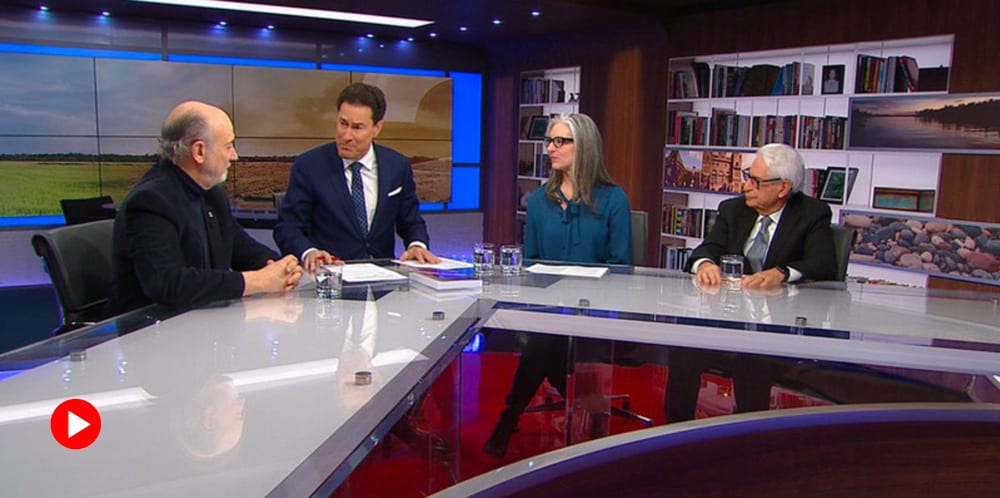
End Growth, Save the Planet? CUSP-co investigator Peter Victor joined a TVO debate to examine whether endless economic expansion is unsustainable. Hosted by Steve Paikin, co-discussants included Chris Ragan, Celine Bak, Atif Kubursi and Sarah Kaplan.

Never before has so much finance been committed to integrating environmental, social and governance factors into decision-making – and yet never before has so much capital been out of alignment with long-term sustainability. This lecture identifies the critical issues at stake in sustainable finance and set out the new horizons for action by the financial sector, financial regulators and society at large.
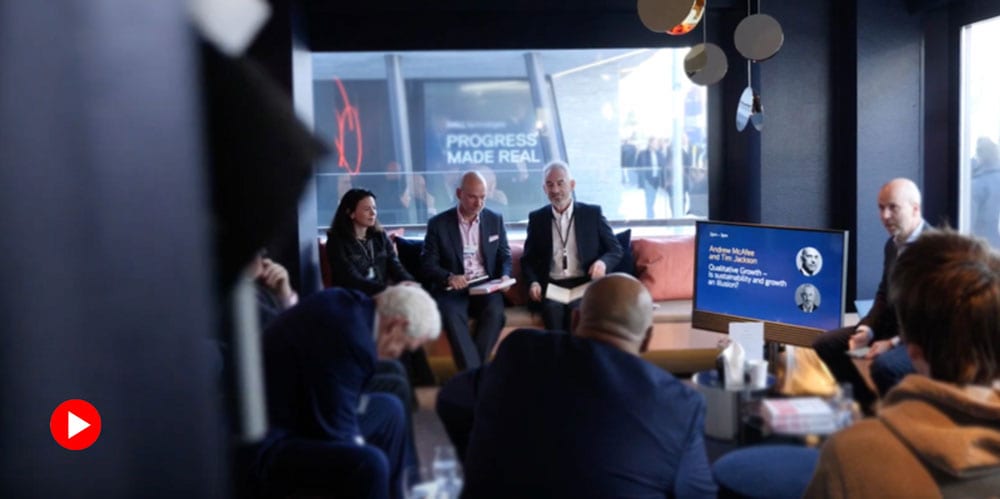
Under the title Is Growth an Illusion?, Deutsche Bank is hosting an event programme in Davos, accompanying the annual meeting of the World Economic Forum; to discuss the future of growth with leading politicians and internationally renowned experts from various fields. CUSP director Tim Jackson is joining a panel with Christiana Riley and Andrew McAfee.

In the wake of the Global Financial Crisis, policy-makers, citizens and critics demanded to know more about what went on inside financial institutions. Daniel Beunza’s new book looks at how economic modelling and moral judgement interact, potentially resulting in predatory lending and systemic risk; breaking new ground in cultural economy and the social studies of finance, by highlighting this interface of morality and models in markets.

In the last decade, a growing number of socio-environmental conflicts have spread across Chile and other Latin American countries. This seminar seeks to explore how grassroots movements understand and defy environmental injustice in their territories, and examines Buen Vivir or Good Living alternatives that they are envisioning.

The RSA Food, Farming & Countryside Commission with CUSP director Tim Jackson as Commissioner and Chair of the Research Advisory Group have published their final report, calling for radical 10-year plan to transition to sustainable food system with more government support for healthy produce.
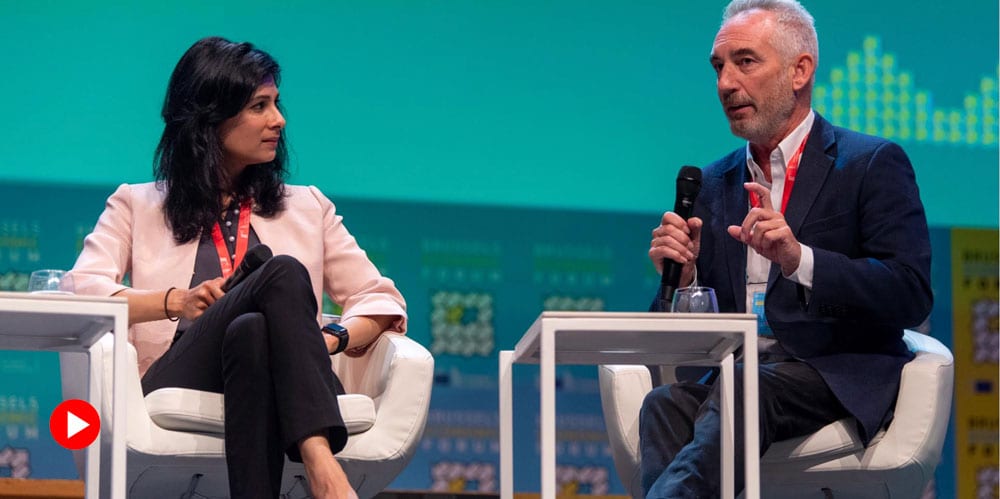
CUSP Director Tim Jackson in fierce debate with high-profile panel on prospects in the EU for reconciling economic growth with social cohesion, fairness and sustainability. Moderated by Viktoria Dendrinou (Bloomberg), co-discussants include Valdis Dombrovskis (Vice-President, European Commission), Nadia Calviño (Minister of Economy and Business, Spain), Gita Gopinath (Chief Economist, International Monetary Fund) and Riccardo Illy (Chairman, Gruppo Illy).

This conference aims to explore from a multidisciplinary perspective the role of risk and uncertainty in the Anthropocene. Papers were invited exploring the specific logics, strategies, forms of knowledge and technologies that different actors are, or should be, using to approach risk and uncertainty.
